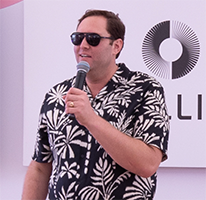Copywriting legend Ed McLean died on Aug. 13 after a long illness. He was 77.
Born in 1927 in Chicago, McLean was possibly best known for his first piece of creative work: a Newsweek control letter that remained unbeaten for 15 years and reportedly reached more than 150 million people.
“Dear Reader,” the letter began. “If the list upon which I found your name is any indication, this is not the first – nor will it be the last – subscription letter you receive. Quite frankly, your education and income set you apart from the general population and make you a highly rated prospect for everything from magazines to mutual funds.”
The letter was revolutionary. It actually told recipients their names were pulled from a list – quite a gamble in 1959.
“At the time, right after McCarthyism, lists were rather unpopular,” said McLean’s son, David, reached at the family home in Ghent, NY. “It beat dozens of letters that tested against it. It was really quite phenomenal,” he said.
McLean went on to write more than 9,000 mailings, direct-marketing print ads, radio spots and publication inserts in a career that spanned four decades.
A veteran of the U.S. Navy, McLean began his business career as a radio-advertising salesman during which time he started a newsletter for sharing tips with other salesmen.
“He constantly broke convention and did things that others might think would not to be in his best interests,” David McLean said.
McLean was one of the founders of the direct marketing writers guild. In 1967, for New York University, he was the first to design a college course devoted to direct marketing copy.
In 1966, McLean created the first airline seat-pocket catalog for Eastern Airlines where items other than airline-labeled merchandise such as playing cards and toy airplanes were sold.
“He was one of the best copywriters we ever had,” said long-time friend Andi Emerson, president of the Emerson Marketing Agency and The John Caples International Awards. “If he were alive, I’d put him up against anybody we have today.”
Besides the recognition McLean’s writing skills received in the industry, they also earned him some unwanted government scrutiny. In the late 1950s, he shared an apartment in New York City’s Greenwich Village with liberal cartoonist, novelist, playwright and screenwriter Jules Feiffer. At the time, some anti-government editorials McLean wrote for the left-leaning Village Voice resulted in federal officials paying a visit to McLean to “question him about his intentions,” said David McLean. However, Feiffer was the cousin of McCarthy’s right-hand-man Roy Cohn and McLean was able use that connection to satisfy his questioners, said David McLean.
Like many marketing copywriters McLean apparently aspired to a career writing fiction. David McLean said he found boxes of unfinished and/or unpublished manuscripts – along with correspondence with editors – in his father’s belongings. The longest manuscript was a mystery several hundred pages long. David McLean said he hadn’t yet been able to determine if his father finished it.
“He used to say often that his marketing skills came from his skills as a consumer and that his creative skills came as a result of his love of literature,” said David McLean. “A lot of his letters contain narrative that is Hemingway-esque. I think he always wanted to be a novelist, but he found his niche in direct marketing.”
McLean’s awards included a Gold Mailbox Award from the DMA for a letter he wrote for Mercedes-Benz in 1965, a Volunteer-of-the-Year Award from DM Days New York, a Silver Apple Award in 1990 and a Caples: Irving Wunderman award in 1993.
He is survived by his wife of 48 years, Ylavaune, and three sons, James, David, and William.
In accordance with McLean’s wishes, there will be no funeral service. His ashes will be scattered in a family ceremony.
 Network
Network

